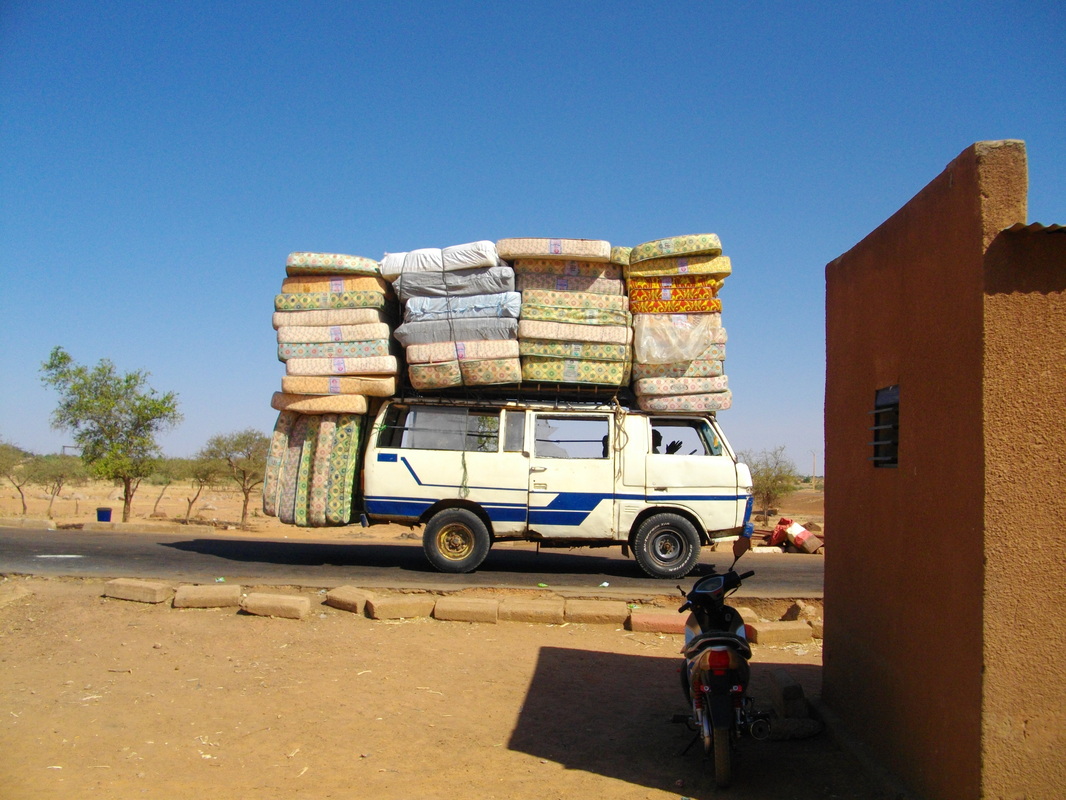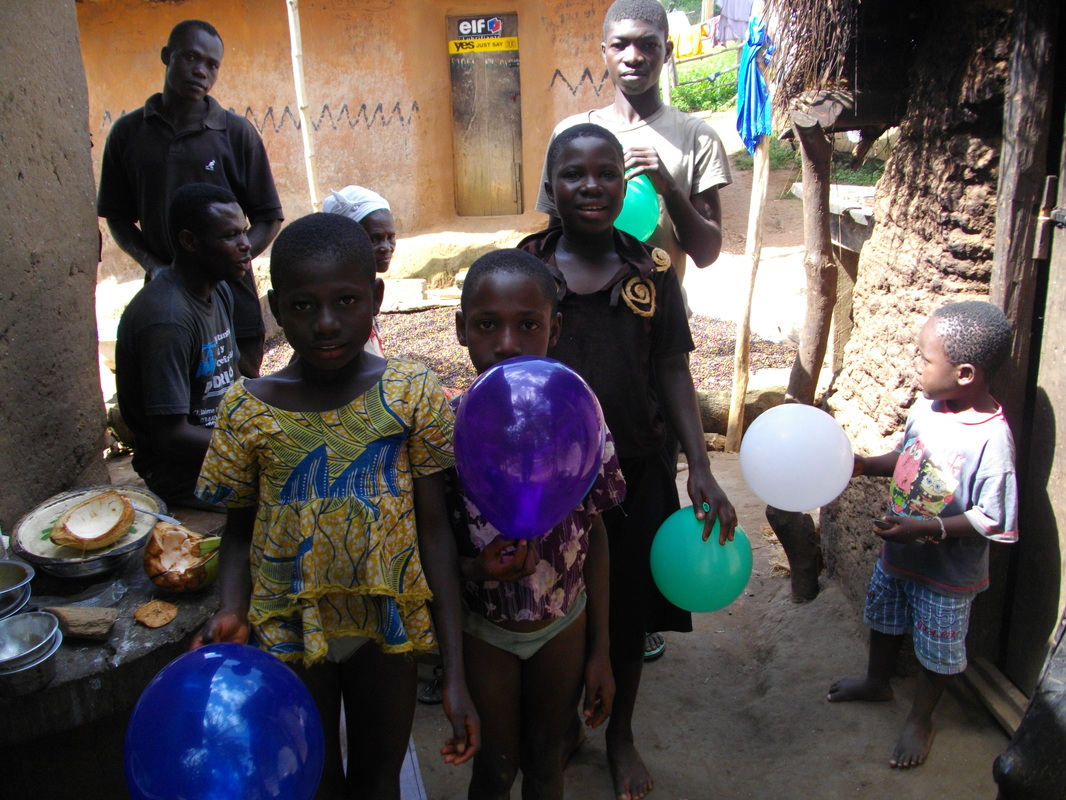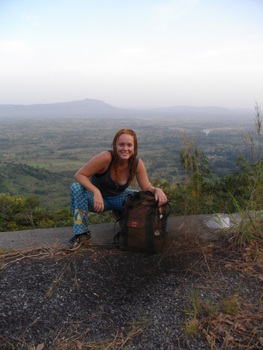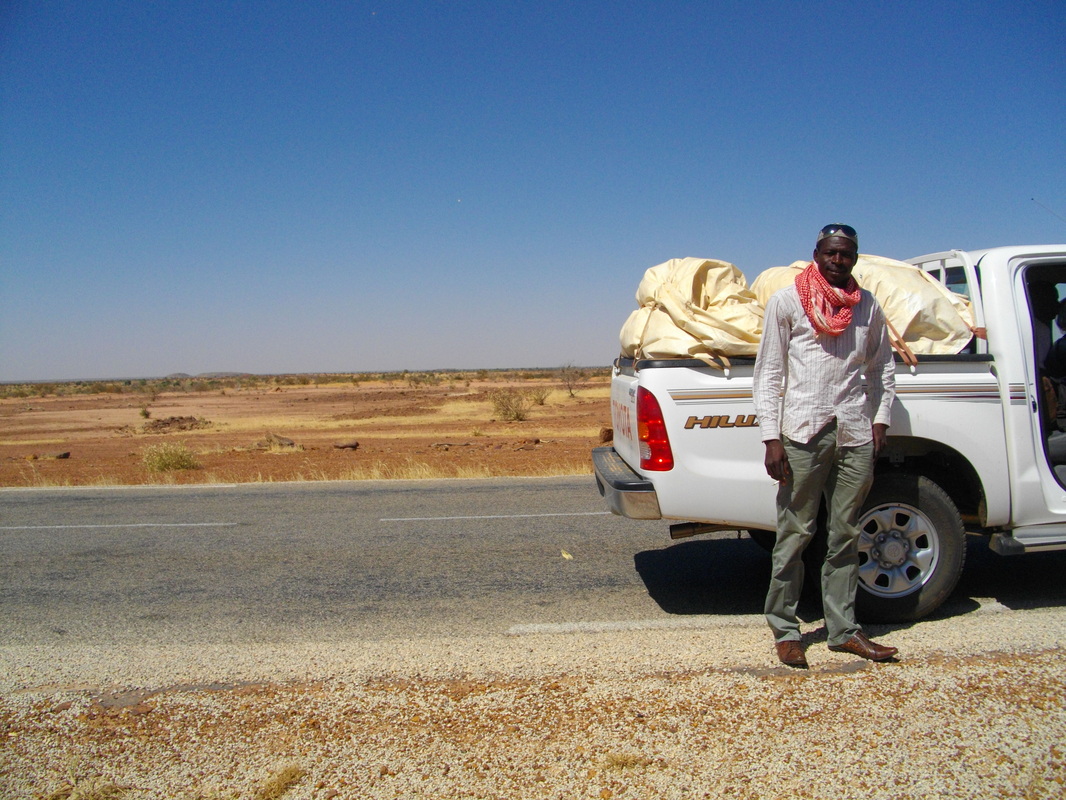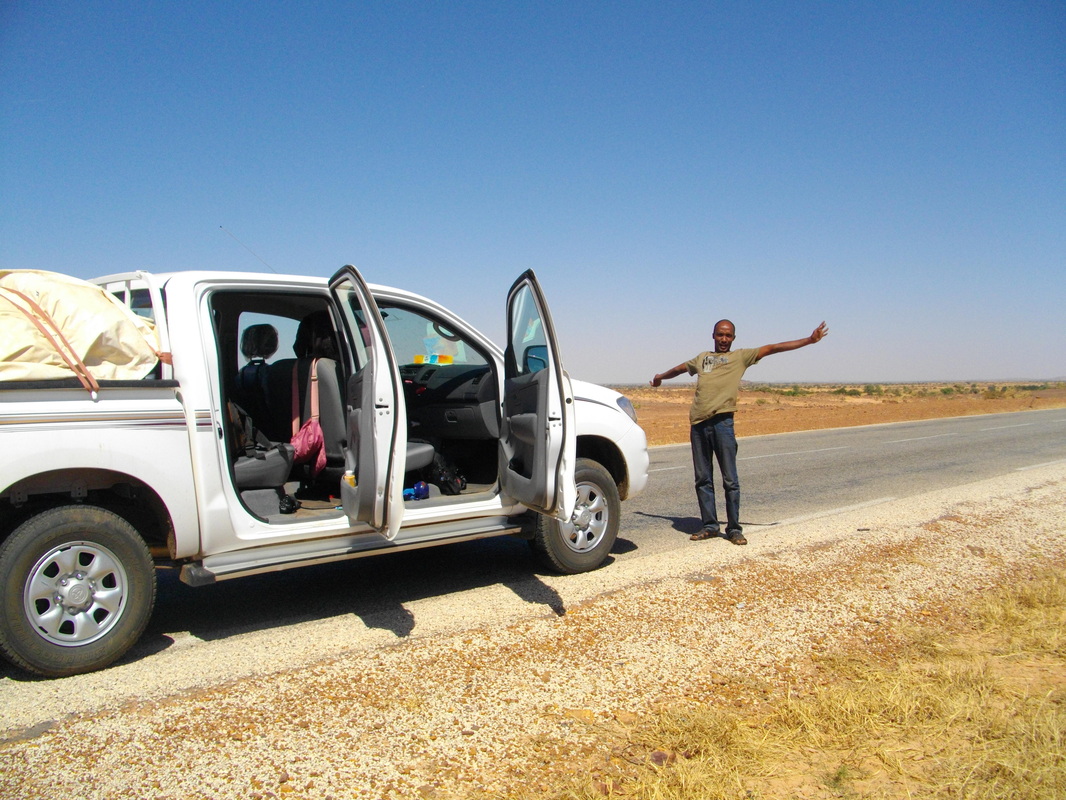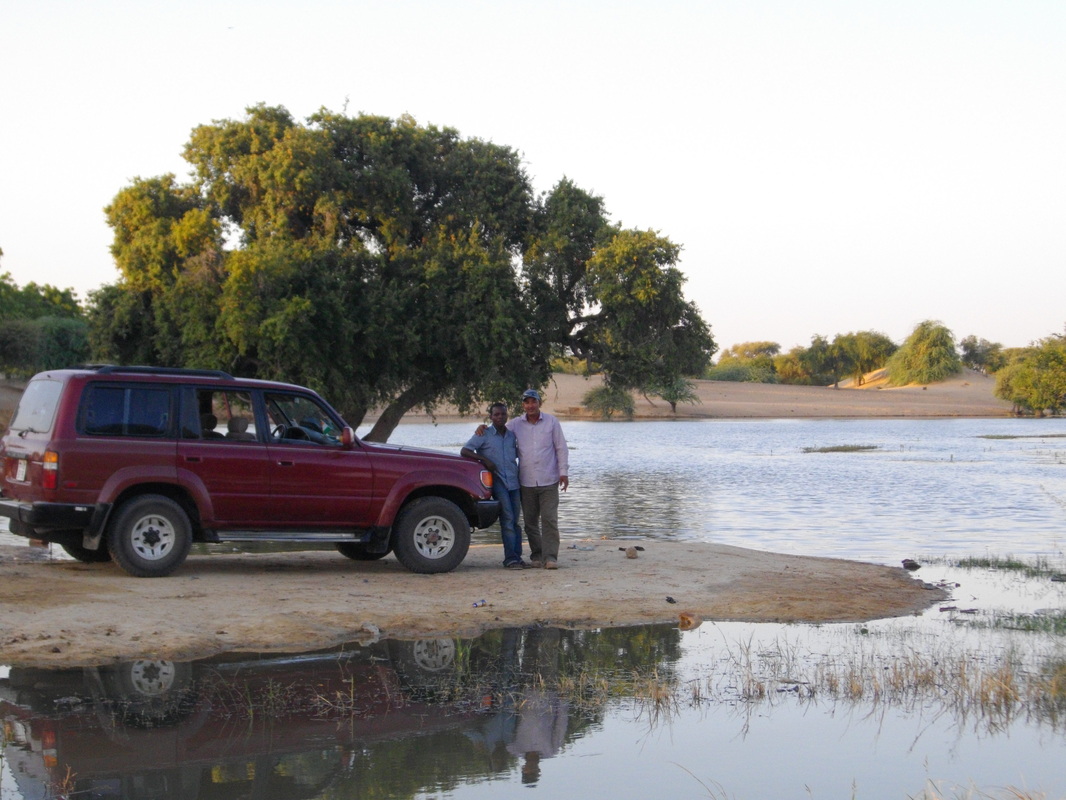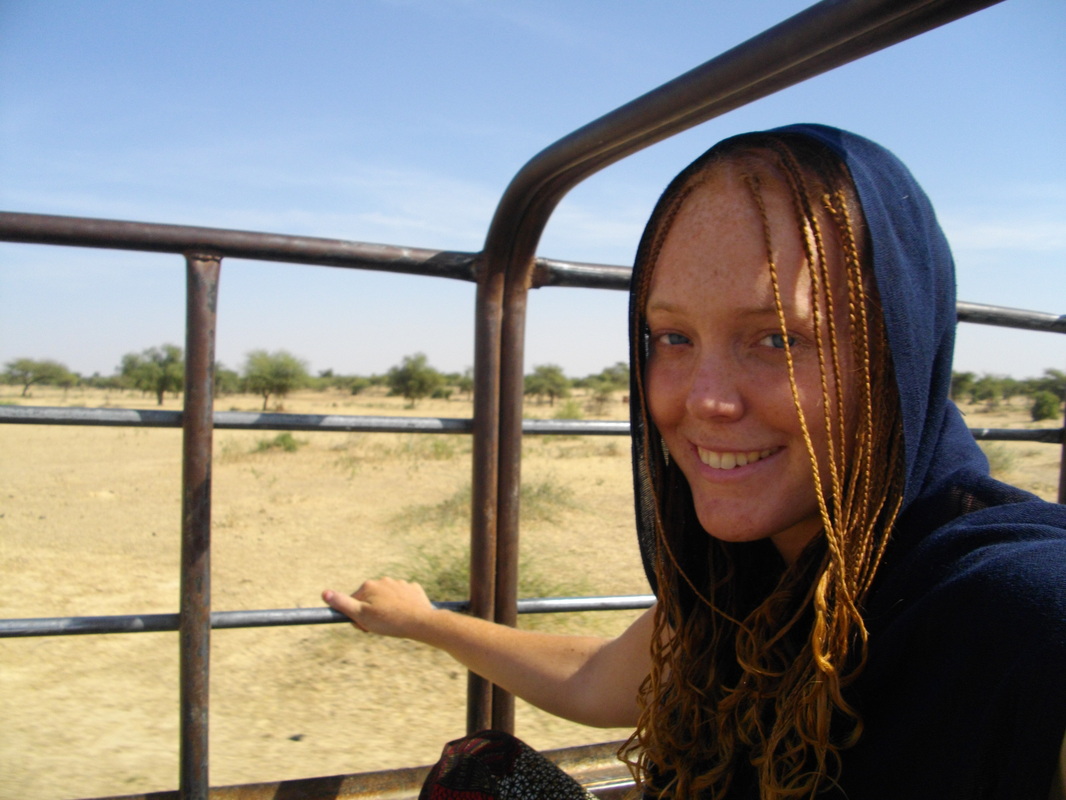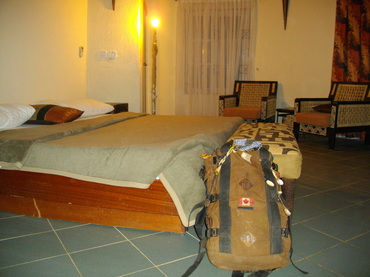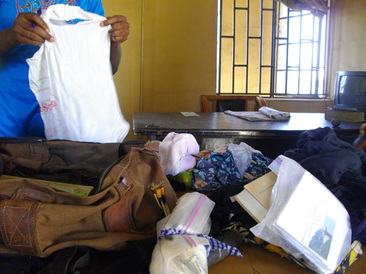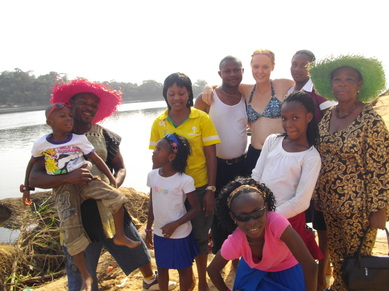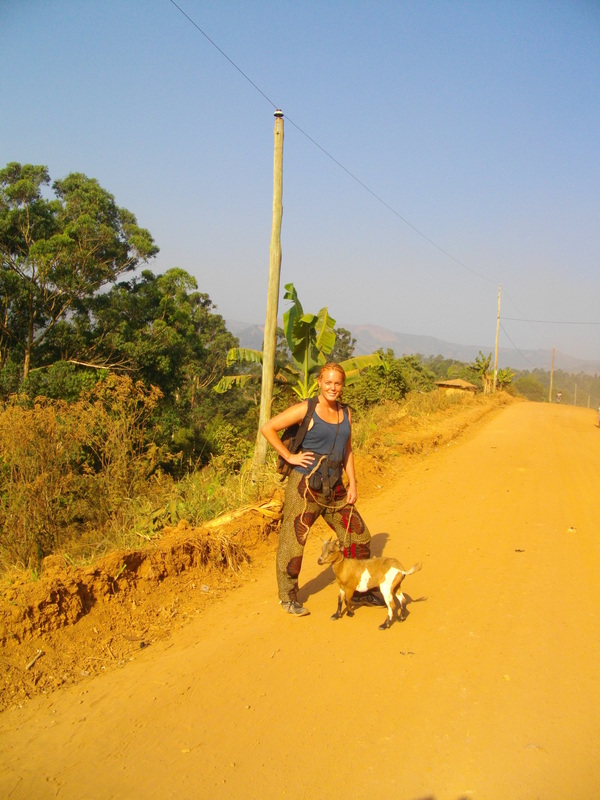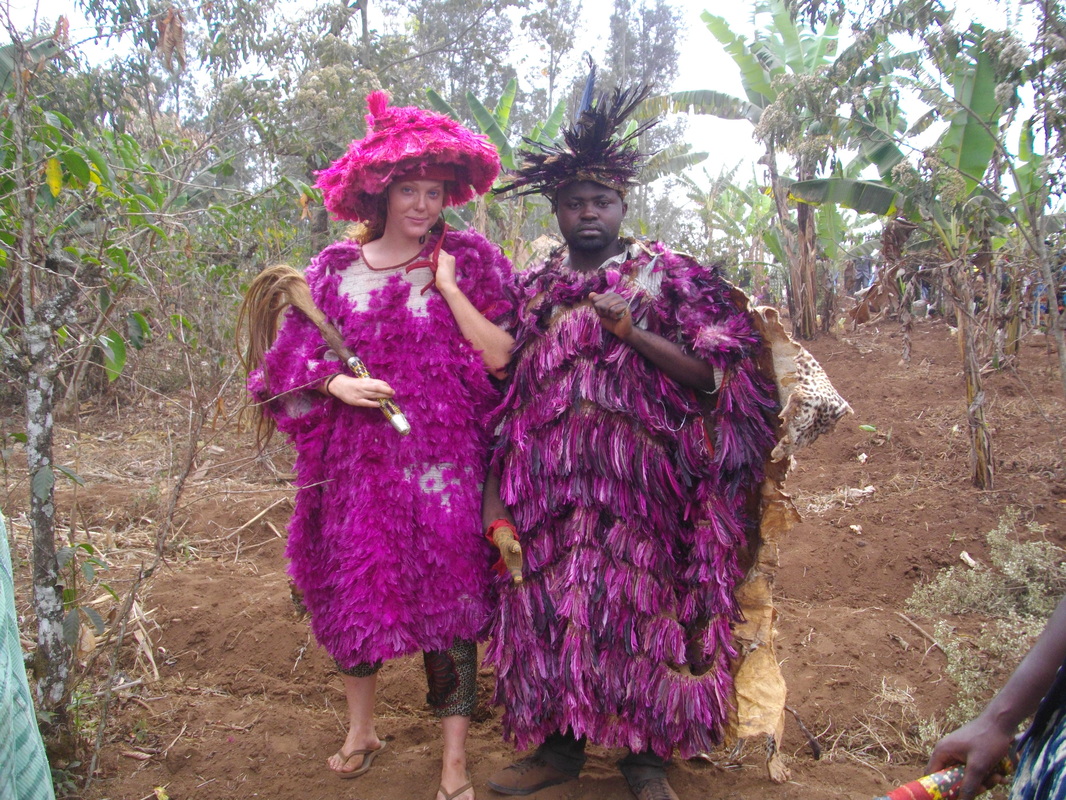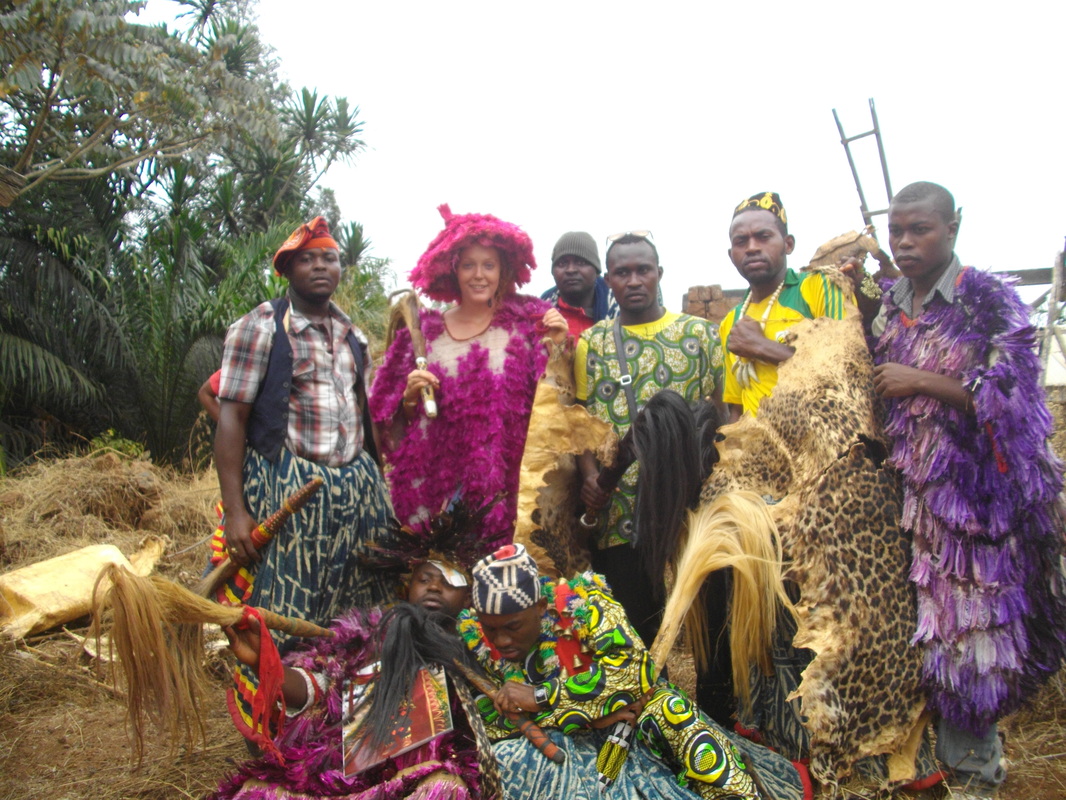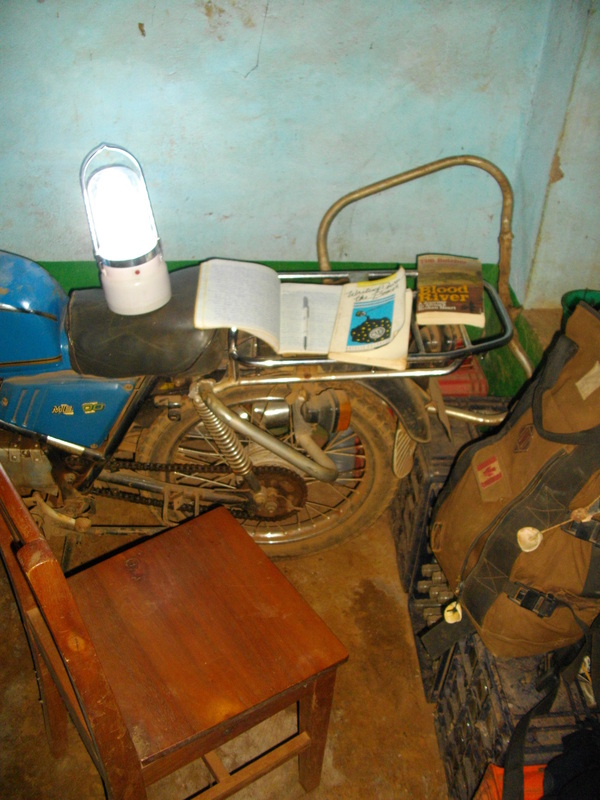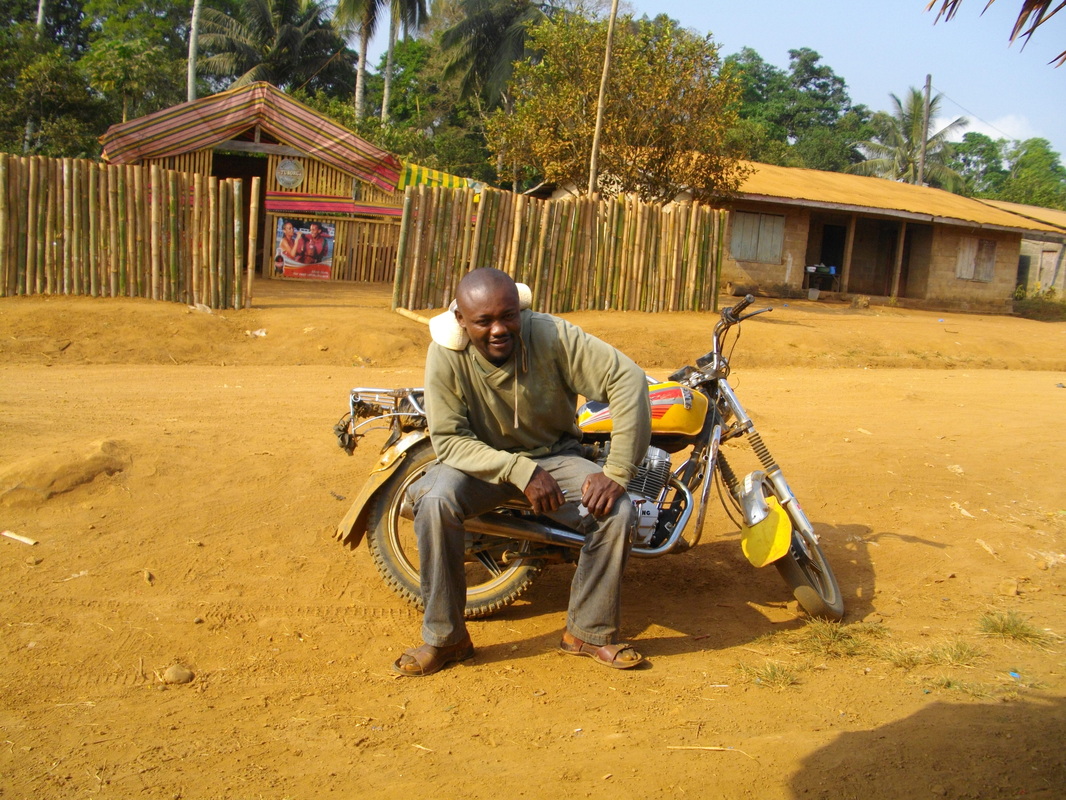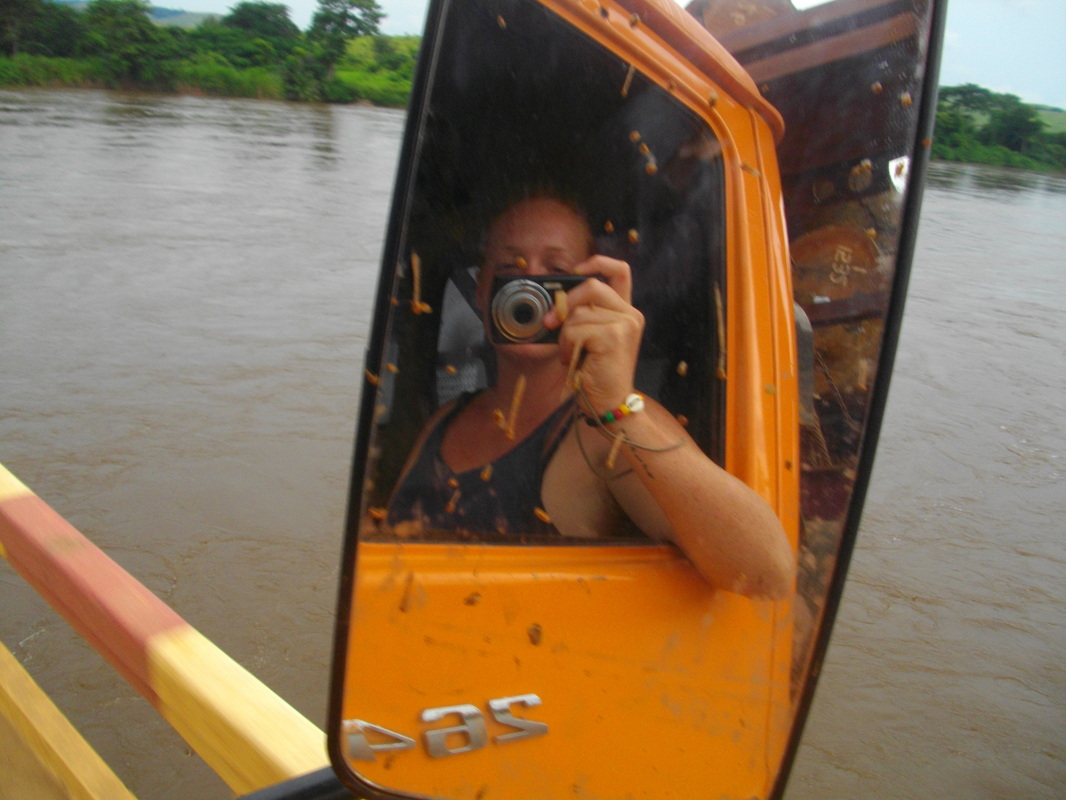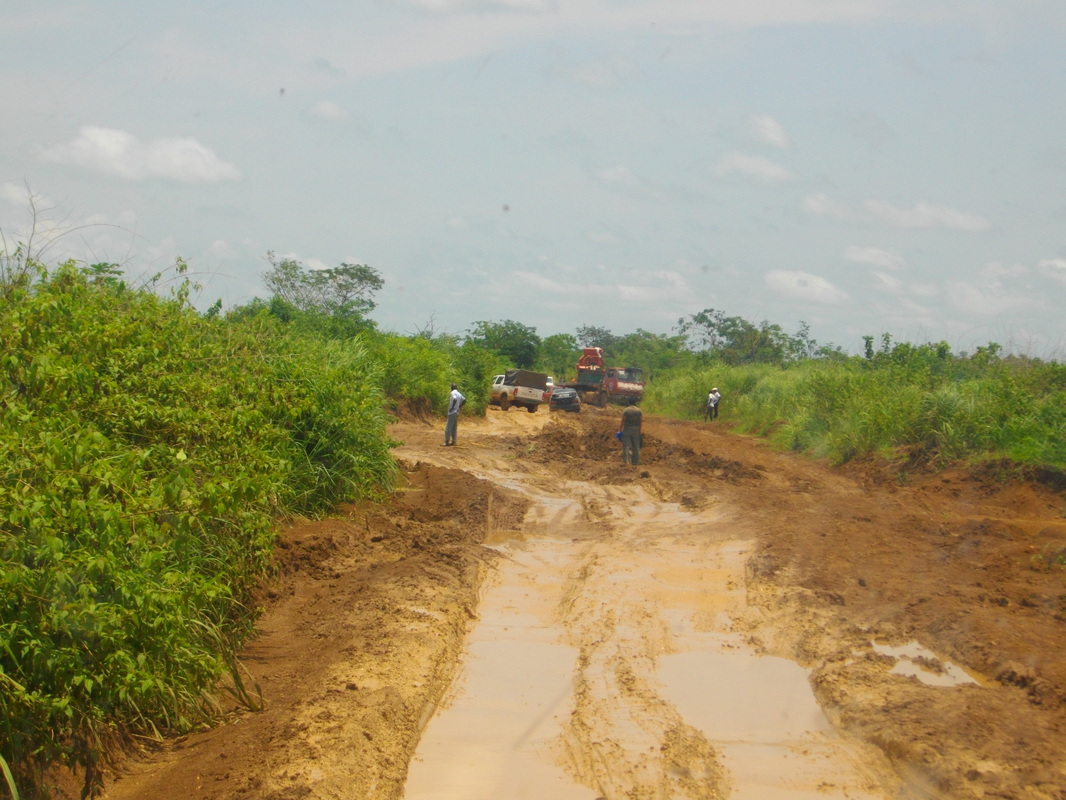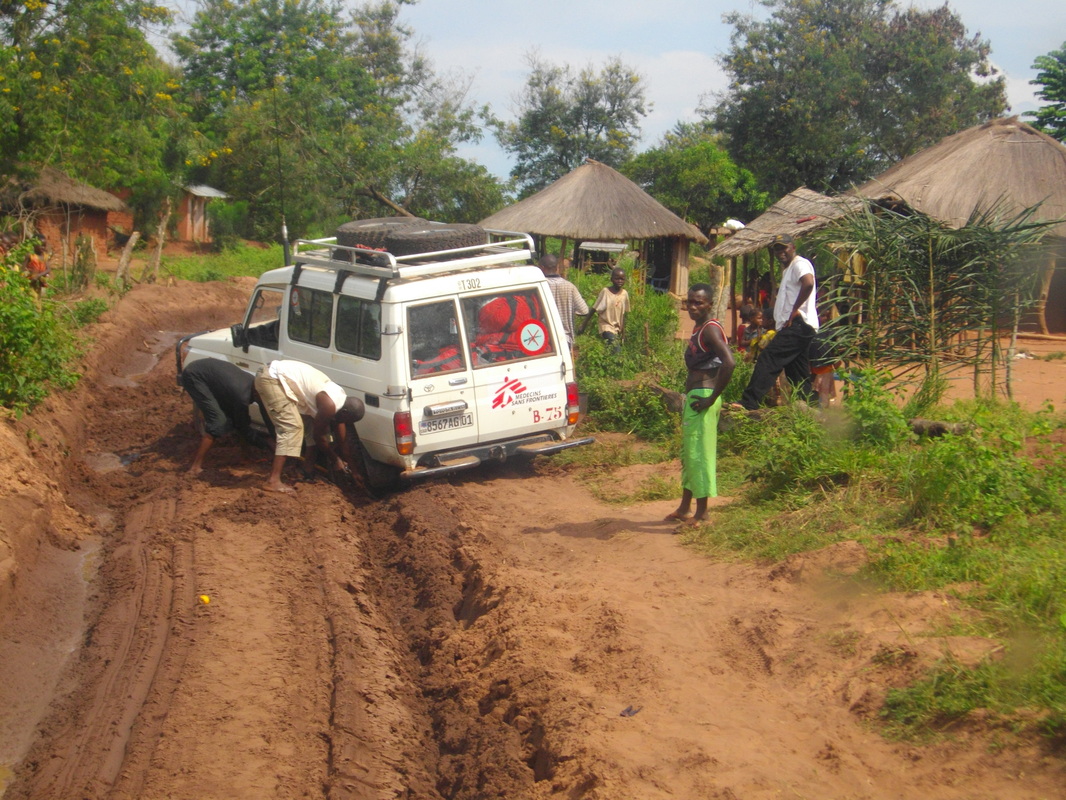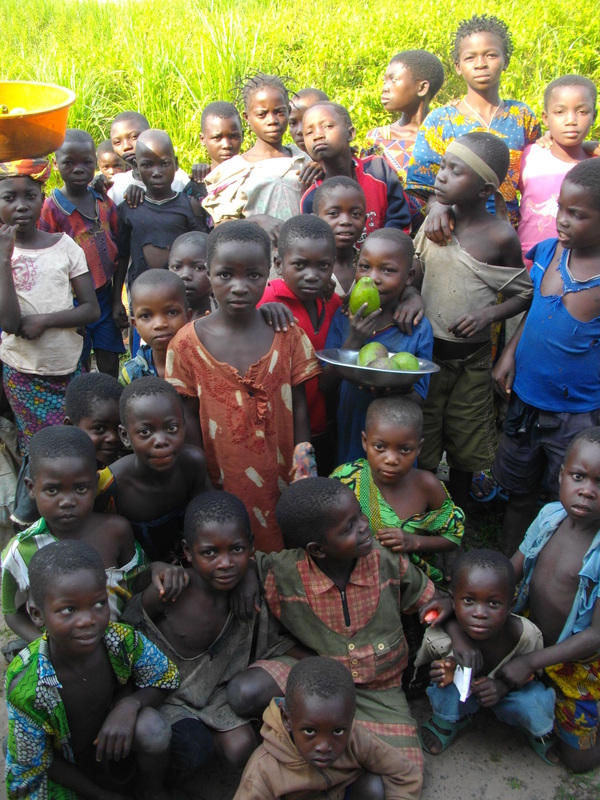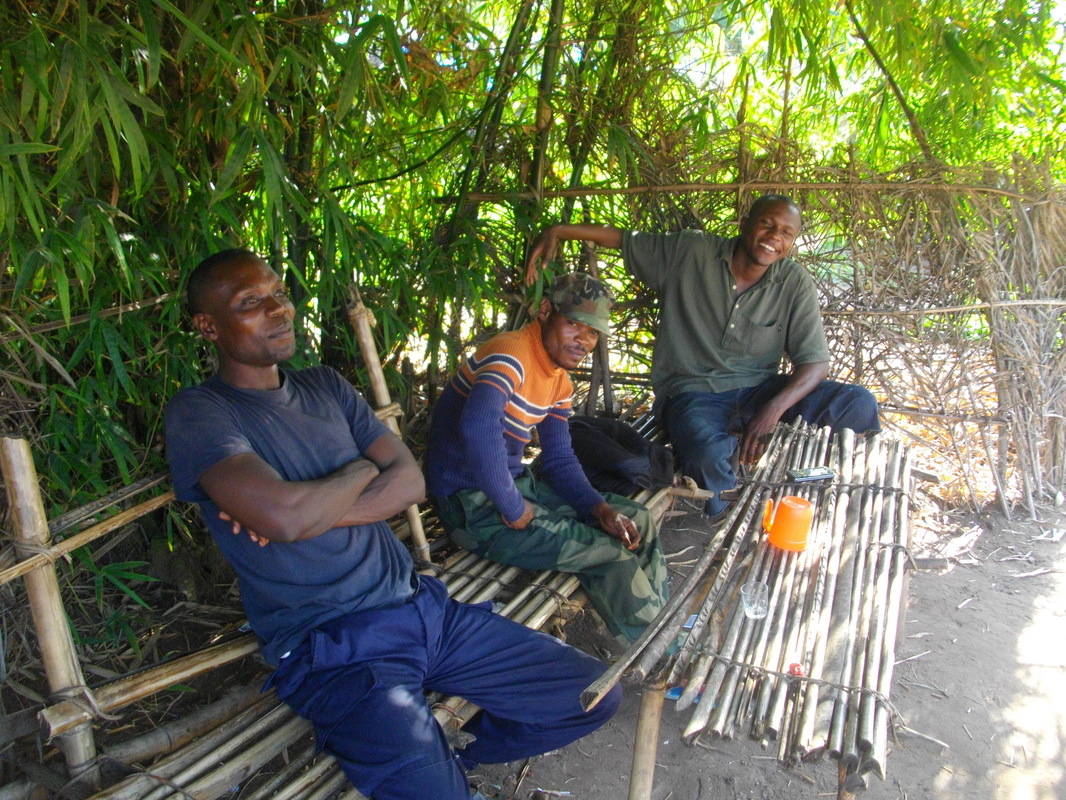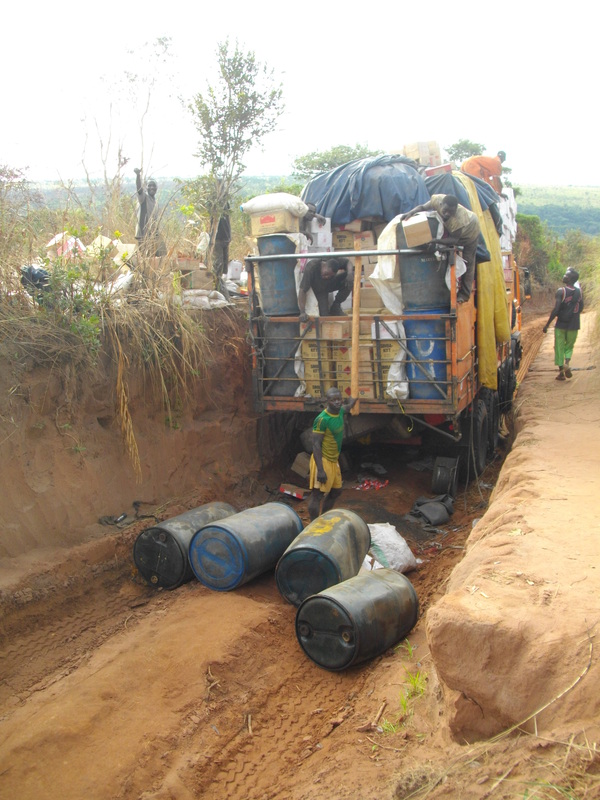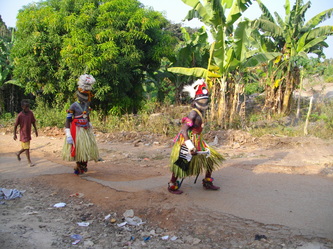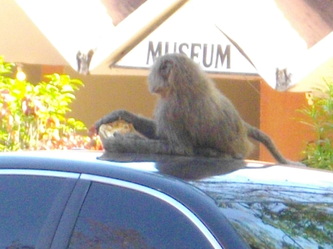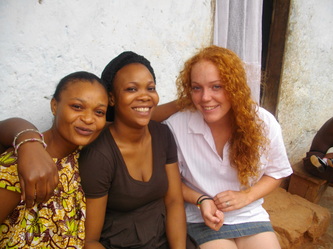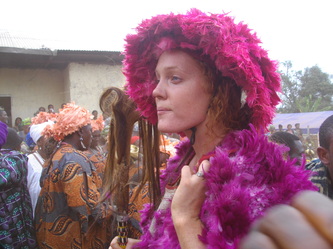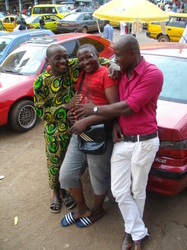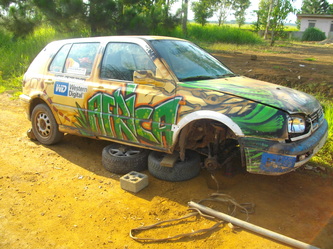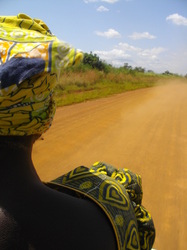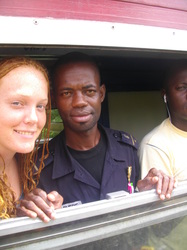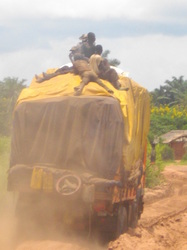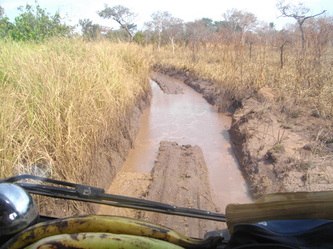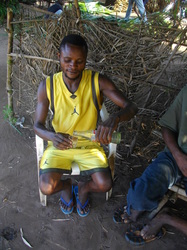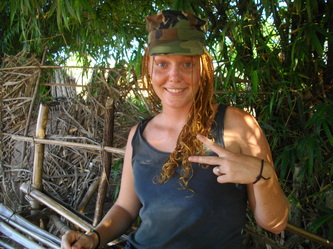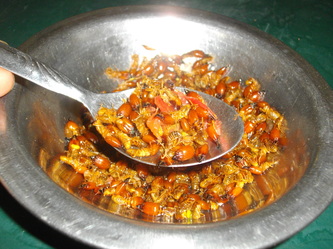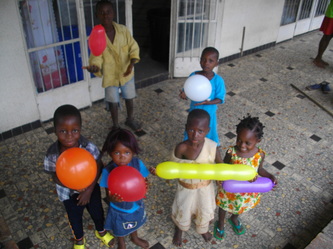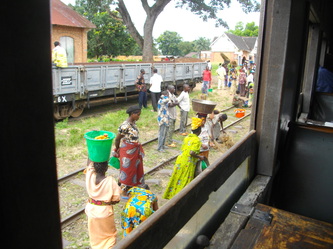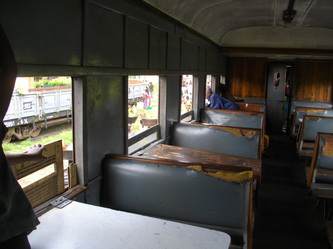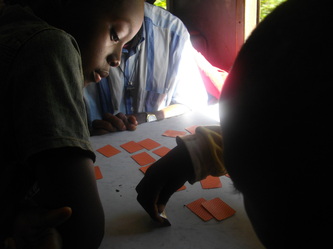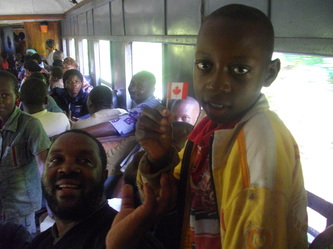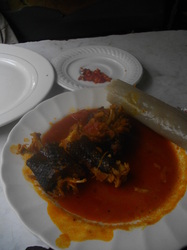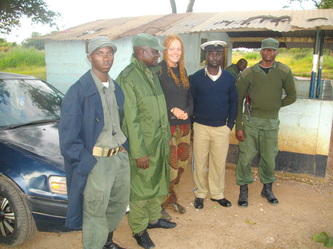Article for German Abgefahren E.V. Autostoppe Club: Niger to DRC
November 2010 - April 2011
|
This article sums up the five months I spent travelling between Niger and southern DRC - crossing from the vast deserts of the Sahel to the think Congo jungle that is known as earth's second lung. It was written at the request of the German Autostoppe Club Abgefahren e. V. for a hitching book they are putting together. I chose to write about the Central African part of my trip because not only is it the least travelled part of Africa, its also where I had the most wonderfully varied experiences. Enjoy! --------------------------------------------------------------------------------------------------- |
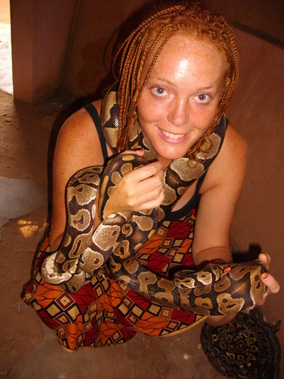
Vodoo temple in Benin.
Ball pythons are worshipped.
It was the end of November in Benin, a country famous for its vodun religion and the impressive ruins of the ancient Dahomey Kingdom. I had been hitching across this vast continent for ten months and so far had only made it through the western countries – starting in Morocco, crossing the Mauritanian Sahara, reaching the Senegalese Sahel, and then tracing circles on the map in no particular direction until arriving at my present location. Up until now I had been confident hitchhiking, had had no trouble with crime or getting rides and overall had enjoyed my experience tremendously. But I was about to enter the stretch of the trans-Africa route that most people warned against: Niger and northern Nigeria, blacklisted on any travel-advisory for alleged Al Qaeda activity; southern Nigeria, infamous for the oil struggle in the Niger Delta; Cameroon, one of the poorest countries in the world; and then crossing the jungle and DRC, where besides the obvious corruption and safety threat there was serious debate as to whether passable roads even existed at this time of year. That said, in my view one of the most annoying things a travel writer can do, especially regarding Africa, is to dwell on the already exhausted stereotype of how hair-raisingly dangerous their predicament was and by extension how they must have been brave and heroic to have taken the situation head on and lived to tell the tale. Everybody has already heard that – in fact it is all most people have heard about Africa and other third world countries – so let me stick to illustrating just how wonderful hitchhiking across this misunderstood part of the world can be.
|
Getting rides to central Benin had been easy; the majority of Beninois live in the south so there is plenty of traffic and therefore ample possibility for rides. The car that had dropped me off at my present location in central Benin had originally planned on carrying me farther north but had broken down in the last village, and, after waiting a full day for repairs, then passing the night on a thin bamboo mat under the stars, it became apparent that the wishful thinking would not pay off. I set off alone along the northbound road.
This part of the country was very sparsely populated, and the smooth roads of the south simply did not exist up here. The only vehicles that I had seen were small taxis overfilling with passengers and luggage, or very occasionally, trucks, which were scared to stop or even slow down for anyone due to a recent epidemic of ‘bush gangs’ with flawless aim throwing rocks at drivers in attempted hijackings. Pondering at what kind of ride this would leave me with I was surprised to see a column of fifteen or so new-looking sports cars and SUVs approaching, all with used-car-lot neon paint scribbled on their windows, and all driving very fast. It didn’t take long before one of these peculiar vehicles stopped for the peculiar foreigner walking along the highway in the bush and I was on my way swerving around pot holes all the way to the Niger border. |
|
Crossing into the desert country happened without problem; no one bothered to note that my five country visa-entente expired in only a few days, and thanks to the convenience of traveling on foot, I was able to walk to the front of the long line of auction cars and pick out a nice air-conditioned SUV to catch an onwards ride from. Turns out all these new-cars were part of an illegal car-dealing ring where vehicles are shipped to the Benin port from Europe, where Nigerians, with their characteristic eye for business opportunity, buy them at discount prices and drive the 2300 km circle north to Niger and then smuggle them into Nigeria across the undermanned desert border, and back to the coast where despite having to pay all the petrol and import fees for Benin and Niger, they still make a better profit than they would if they had to deal with Nigeria’s corrupt port authority. People do what they can to get by. I elected not to accept the offers of border hopping with the car dealers into Nigeria: I had a Nigerian visa so why not go in legally, plus there was still all of south eastern Niger to see. It was well after sunset when the last driver I rode with dropped me off at a military checkpoint so I could pass the night in safety. As always happens when walking up to an army post in Africa and requesting a place to crash, they are bewildered and slightly confused at first but in the end happy to comply. This night was especially lucky: the chief of the post was there and had someone make up a cot for me in the dorm-style army barracks. The extra blankets were much appreciated – November in the desert boasts some very cold nights (as I later found out, sans blankets).
|
|
It was an early rise the next day, and the chief insisted on serving hot tea, bread, and a tasty fried egg. As we sat and chatted, I watched the road for potential rides. Then a caravan of vehicles began to pass that was far more interesting than the Nigerian car dealers. This one had over fifty vehicles: mostly large late-model trucks packed to the brim with supplies, and shiny new black SUVs with dark-tinted windows. Since Niger is an incredibly poor country I doubted even the president would put on such a show, however it soon became obvious by their red and white checkered scarves that these were Saudis. After trying a few approaches of questioning the candid soldiers about what was going on, I pieced together that a Saudi prince was taking his yearly falconry expedition deep into the desert, where he pays off the Niger government for the right to hunt whatever he wants and has an entire luxury camp set up including air conditioned trailers and all the water and gourmet dining royalty could desire. That is where all their oil money goes. |
|
I watched this caravan for awhile and then said goodbye to my military friends to try to hitch a ride, but not one vehicle even slowed down. Not surprising. I walked along the highway for a couple of hours; the few vehicles that passed were completely packed. Finally a pickup pulled over, I ran up happy at the prospect to get out of the hot sun. They too were full with four guys and luggage, but I got good vibes from them and they were happy to clear me a space; plus, they offered a 500 km ride with air-conditioning! Definitely not to be turned down.
It took the whole day to arrive in Maradi. Moussa, Issa, Mohamed and Hassan were government workers hired to fix a cell phone tower, and all spoke fluent French so we were able to chat the entireride. What struck me most about them and other Nigeriens was how proud they are of their country. According to the World Bank Niger is 176 out of 180 in the per capita GDP rank (DRC takes the bottom spot); my friends pointed out schools with no walls and only shabby roofs and dirt floors to sit on, they said very few people outside of the capital had ever experienced electricity other than the odd generator. But they were all very positive and happy to be where they were – I didn’t get the “please get me out of here” vibe that too often emerges in third world countries. They insisted on buying me lunch and went out of their way to find a military checkpoint where I could sleep. What a great introduction to Niger. |
|
The next few days were typical desert hitching – long haul rides with the occasional camels and horses in the distance, and a few sand dunes to break the monotonic flatness. I had hoped to cross paths with the Saudi caravan again but apparently they had turned north, heading directly into the heart of the desert; my idea to become an accomplished falconer would have to wait. Diffa was the last town eastbound that had a border crossing with Nigeria, so after spending two days with the family of a friendly truck driver he drove me to the tiny border post. My Niger visa was expired and when the guards looked sternly at my passport , demanded over and over again what I was doing, and began making phone calls I thought my luck with ignoring visa requirements had run out. But it turned out that they were calling their supervisors because they didn’t think that Nigeria was safe enough to let me leave Niger and go there alone. After more grim tales and austere warnings, similar to those I had heard from all other West Africans about Nigeria, they had no choice but to let me walk across the little bridge that separates the two countries. |
|
As soon as I walked up to the Nigerian border post the guards made sure I had a visa and then welcomed me with open arms. They called the village vendor to bring a luxury can of Coke and freshly baked potato, and then insisted I wait until they found me a ride. After a few hours a vehicle finally came by and the Arab drivers let me jump in the back of their ancient pickup to bring me to a more frequented road. This was the one time I was glad I hadn’t attempted walking, as it turned out there was no clear trail through the desert and even the experienced Arab drivers got lost several times before happening upon some wandering goat farmers who explained the route. After a few days in the northern town of Damasak, feasting on deep-fried locusts, getting an introduction to the interesting world of cinema that is Nollywood, and enjoying the perks of being the guest of the police chief, I said goodbye to the desert of North Africa for the last time and headed towards greener land. |
|
There were memorable hitchhiking experiences all through Nigeria: Getting picked up by Ajiya, a chief in the Hausa town of Potiskum who talked of his role in the famous Durba horseback festivals, then invited me to spend the night with his welcoming family and showed off his royal pet impalas. Mohammed and Jimmy, the managers of the Yankari Game Reserve, who somehow found a way for me to spend three complimentary nights in one of the park’s nicest luxury tourist suites, plus a safari with some awesome university students, personal hiking tours through the baboon and antelope filled woods, and all the time in the crystal clear natural hot springs that I could want. Then there were the police who held me up eight hours insisting on checking everything I owned, on a hunch that I was a spy (by the end they tried offering money as a way of apologizing. I stubbornly refused). That same night, after leaving those suspicious officials, I was on the road hitching further and was offered a ride by elite members of the Nigerian Air Force who ended up inviting me to their top-security base for dinner and a place to stay, plus a 500 km ride the next day – it’s funny how luck can turn so quickly. My last days in Nigeria were spent between the Calabar Carnival and hitchhiking through the Niger Delta - I quickly came to the conclusion that rebels trying to kidnap rich oil workers tend to overlook girls in rugged clothes walking along the side of highways. I was en route to meet a Couchsurfing family for Christmas, and Lois, Amari and their kids made me feel more welcome than I could have hoped – it was my first Christmas away from home. |
|
Leaving Nigeria I got my first taste of the fabled Central African mud. It wasn’t even full out rainy season yet, but the road was sunk so deep in the mud that the banks on either side were higher than the vehicles. No room for a breakdown here. Spent quite a few weeks in Cameroon – it quickly moved to the top of my list of favorite countries to travel in. At one point I bought a young she-goat, named it Kyle (after my brother), and hitched with it through the brown Bamenda mountains; I partied for New Years Eve on the black sand beaches near Mount Cameroon, Central Africa’s highest peak; later I met awesome people in the capital Yaoundé who took me to their natal village and dressed me up as a giant pink bird to dance as the princess in a funeral festival. And the best part was that throughout the whole country, hitchhiking barely required signaling vehicles, they just see you, stop, offer fresh pineapple or avocado, and take you where you need to go. Simple. |
I ended up staying so long in Cameroon that not only was my visa for that country well-expired, but my Gabonese and Congo visas were also running out. Leaving Yaoundé I figured I would have to exit the country via the smallest border post possible so that questions about my outdated documents would be kept to a minimum. This required a 100km walk along a path that supposedly sees vehicles during the dry season, but at the moment there was little hope of anyone passing on four wheels, unless they were attached to a fancy 4WD. A few motorcycles braved the mud and offered shorts lifts, but mostly it was just me, the woods, and a few Pygmee and other villages. In the end, the perseverance paid off and in the last village before the border the area chief invited me to stay with his family, and he told the border guards to ignore visa dates and stamp my passport before arranging for his son to take me the rest of the way to Gabon. Score!
|
It took a full day to get out of the remote corner of Gabon where I had crossed in from Cameroon, but as soon as I got back to the main road I found the luckiest ride possible and was speeding 400 km through the dark jungle with a doctor and his traveling family. They took me to the end of the road – literally – and I knew it was dirt, dust and mud for most of the next 2500 kilometers – neither southern Gabon nor either of the Congos had much more than the bare minimum of paved roads. Through the first two – Gabon and the Congo-Brazzaville – the majority of rides came from foreign industry: Chinese road workers, Malaysian timber exporters, and foreigners belonging to any sort of mining operation. The mud was ridiculous. At one point, the truck I was riding in got stuck, and despite my attempt to step out carefully, I immediately sunk knee deep into the clay-like mud. All vehicles carried mud shovels to dig themselves out, as off-roading Canadians do for winter snow.
|
|
Leaving one Congo for the other, from the Republic to the Democratic Republic, I once again was running on an expired visa but thanks to a Russian miner and his friends in high places, I had a contact at the Brazzaville immigration and got through the official business smoothly. Crossing the great Congo river and arriving smack into the middle of DRC’s Kinshasa was overwhelming, but, as in the other giant African city of Lagos, having a Couchsurfing contact made all the difference. I spent a few days with trustworthy new friends showing me the city, with the upbeat rumba beats always heard somewhere, and a never-ending supply of the ubiquitous Primus beer – known as “the only beer that doesn’t run out in the Congo”. My Angolan visa attempt failed miserably, so, despite everyone’s claim that crossing Kinshasa-Lumbumbashi overland was near impossible by road, I had no choice but to brave it (I could have hitched on a plane – completely possible – but overland is always more fun).
|
|
The 1500 kilometers across DRC doesn’t take long to write about. It can be summed up in one word: mud. After the first few hundred kilometers on “freshly paved” tar, which will probably have become nearly impassible by the time of writing as it was a paper-thin coating that was already severely potholed when I passed, the road came to an abrupt end and deep sand and mud was all that followed. There was little foreign industry in DRC due to the government’s unpredictable foreign policy, so the only trucks that did the route were so old and out of shape that they broke down every few hours and had to undergo serious mechanical attention – whether patching up already over-patched tires, fixing the engine without any possibility of spare parts, or (in the worst cases) having to unload and reload the excessive amount of goods packed on due to a poorly balanced load. At one point it took six days to go 200 km. Sometimes the entire procession of vehicles on the route –about five or six per day – would be held up by one that had broken down or tipped over, with no possibility of passing it due to the high mud banks surrounding the road. Sometimes it seemed as if we were following something more describable as a “mud-river” than a road. At another instance the truck I was riding in simply couldn’t make it up even the slightest incline because the rain had turned the red clay into a slippery sludge that packed onto the tires and sent the truck sliding backwards. Being on the road every day, it took half a month to get to Kananga, the midway point of DRC. Here I got lucky – somehow I was introduced to the future mayor of the town, a Congolese man who had spent about a decade in America, who was happy to go out of his way to help out someone from his old continent. He gave me a place to stay and bought me a ticket on the train to the next station – about a hundred kilometers onwards. The train continued all the way to Lumbumbashi, my destination, and once I boarded the conductor immediately became a friend and offered to let me ride the whole way gratuitement. It was supposed be a two or three day trip, but it took thirteen. Just like the trucks, the locomotive didn’t have the power to pull the full 12-car train up even the slightest incline so we had to be split into three car sections and pulled up individually anytime there was a hill. Compound that with the fact that after we changed to electric power we were forced to a halt every time there was a power outage, which, as anyone who has traveled in any of the poorest countries in the world knows, happens quite frequently. It was a fun ride though, full of camaraderie and interesting conversation. We passed the cold nights sharing sleeping space on the crowed floor of the kitchen car or on the tiny dining tables. I passed my 24th birthday stuck in a tiny village somewhere between Lubudi and Kabwalaa; my new friends celebrated the occasion by grilling me up some python stew and setting out a few harsh shots of Tchichapa – Congolese corn whiskey – chased with warm bottles of Simba brew. Could never have asked for more.
|
Stepping off the train in Lumbumbashi was like stepping into another world. On the political map it is still part of DRC and Central Africa, but in reality it is clear that this city is a part of Southern Africa – more developed, better governed, less poverty. I knew immediately that hitchhiking southbound from here would be easy – too easy; travel times could once again be estimated based on distance, road condition counted on, cars passing were guaranteed to be able to make it a few hundred clicks without breaking down. I was almost urged to turn around and head back into the muddy, unpredictable jungle. I knew that south of here there were McDonalds, Starbucks and fancy shopping malls. I felt I was leaving the Africa I had grown to love. But alas, new roads were ahead, and I really had no idea where they would lead. Even the super-developed countries of the West have wild lands where one can go to find adventure. With that thought in mind, I jumped on the first truck that responded to my outstretched thumb and made my way out of DRC, into new lands and new experiences.
A few very short video clips of travels through DRC
|
|
|
|
|
|
|
